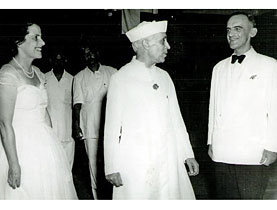Swiss mark 60 years of friendship with India

Switzerland and India are marking six decades of strong economic and cultural relations since the signing of a treaty of friendship in August 1948.
Journalist and writer Bernard Imhasly tells swissinfo about early friendly relations between two very different societies, the evolution of economic cooperation and the state of cultural relations.
In numerous articles and books, the Swiss-born Imhasly has described and commented on the rapid development of the world’s second most populous country.
He arrived in the country a quarter of a century ago, working first as a diplomat in the capital, New Delhi, and then as a correspondent. For the past year he has lived in the city of Mumbai.
swissinfo: Switzerland was the first country to sign a treaty of friendship with a newly independent India. Why Switzerland?
Bernard Imhasly: The then prime minister, Jawaharlal Nehru, was looking for countries with which India could establish friendly as well as political and economic relations – in particular, countries without a colonial history and not great powers like the United States, the Soviet Union and China.
Additionally, Nehru knew Switzerland from several of his visits. Switzerland, for its size, already had a large international and strong economic presence.
swissinfo: When did Swiss companies first become interested in India?
B.I.: In the 1950s, Swiss firms were among the first major investors in India. Swissair flew to Bombay [now Mumbai] daily. But even before that, during the colonial era, Nestlé, Geigy and Brown Boveri were there, and increased their presence following the country’s independence.
Included in these pioneering Swiss companies in India were the machining firm Oerlikon-Bührle, rail manufacturers Schlieren and Schindler, and the textile companies Sulzer and Rieter. The pharmaceutical company Ciba built their largest research laboratory in Asia in Bombay at the end of the 1950s.
swissinfo: Indian computer scientists are present around the world, including in Switzerland. How do you explain the Indian prominence in this sector?
B.I.: The computer science boom in India was partially born out of necessity. The programming industry forced experts to innovate early on.
In the late 1980s, some entrepreneurs noted that they could not compete with the high tech field in the area of hardware – from calculating machines to data processing – but could keep up in the field of processing, analysis and machine programming thanks to their knowledge.
swissinfo: How did Switzerland discover outsourcing to India?
B I.: A manager of a computer company in western Switzerland had learned during a visit to his parent company in Detroit that the city digitally outsourced the management of its systems to an Indian software firm. After that, the Swiss manager became the first representative of a European firm to make contact with the Indian company.
Later, Swissair was the first airline to partially outsource its accounting and reservation system to Bombay.
swissinfo: Switzerland and India cooperate in science and research. What form does this take, exactly?
B.I.: There have been large state-funded projects in the area of academic exchanges between the two Federal Institutes of Technology and the Indian Institutes of Technology, and for the past 20 years there has been cooperation in the biotechnology field.
Surprisingly, the Swiss Agency for Development and Cooperation (SDC) was responsible for this. It recognised early on that it was not just about getting directly into the villages to fight poverty, but also to work in research and development to find solutions to the country’s big problems.
swissinfo: What does the SDC do in India today?
B.I.: As per a decision by the Swiss government, India is no longer a priority country for development cooperation. Funding was reduced from SFr30 million ($27.6 million) to between SFr8 million and SFr10 million. Large projects are no longer possible. I personally believe this is a bad policy.
swissinfo: Why?
B.I.: The Indian economy is growing very quickly, but per capita India is still a very poor country. Switzerland has set important standards and demonstrated that much can be achieved with few resources. The disappearance of this partner leaves a much larger gap than these few million francs represent.
swissinfo: India is losing development aid and the country, and the economy relies on the cheap labour in this developing land. Are foreign companies exploiting India?
B.I.: No, India is not being exploited. The cheap jobs are only cheap from a Swiss perspective. Here in India, these are well paying jobs. It is not the obligation of Swiss companies to reduce the poverty in India, but through their activities, they bring a degree of prosperity, knowledge and technical skills into the country.
swissinfo: Switzerland and India also cooperate in the cultural field. In early 2007, Pro Helvetia opened an office in New Delhi. How is Swiss culture presented in India?
B.I.: Swiss culture is part of European culture – an urbane, post-industrial culture. The cultural exchange or dialogue between the partners is done in the major cities, where there is an elite that understands and responds to cultural initiatives. Against the background of the whole society, it is more modest. However, it is important.
Cultural cooperation happened earlier. The National Institute of Design in Ahmedabad was built in the end of the 1950s with close cooperation between the art schools in Basil and Zurich. The first generation of designers emerged from this institute and was heavily influenced by Swiss artists.
swissnfo-interview: Susanne Schanda
On August 14, 1948, Jawaharlal Nehru, the first prime minister of India, and Armin Daeniker, the Swiss ambassador, signed a Swiss-Indian Friendship Treaty.
Switzerland, one of the first countries to recognise India, has called the relationship between the two countries “excellent” and a “privileged partnership”.
Apart from science and technological cooperation, Switzerland wants development programmes to focus more on environmental and energy issues, the foreign ministry said on Thursday.
Bernard Imhasly has published an anthology of essays, memoirs, reports and commentary of Indo-Swiss cooperation to commemorate the 60th anniversary of the treaty.
The book will be released at the Swiss embassy in New Delhi.
In Switzerland the Mega Mela festival of Indian associations will take place from August 22-24 at Zurich’s main train station.
Bernard Imhasly was born in 1946 in Sierre, in canton Valais.
After completing schooling in Einsiedeln, he studied languages and ethnology at Zurich University.
In 1978, he joined the Swiss foreign ministry and was a diplomat in New Delhi until 1990.
After his career as a diplomat, Imhasly and his Mumbai-born wife decided to stay in India. He spent 17 years as South Asia correspondent for the Neue Zürcher Zeitung newspaper.
His book – Goodbye to Gandhi? Travels in the New India – was published in 2006.
In 2007, Imhasly moved to Mumbai, where he has concentrated on social and development projects, and on writing.

In compliance with the JTI standards
More: SWI swissinfo.ch certified by the Journalism Trust Initiative



You can find an overview of ongoing debates with our journalists here. Please join us!
If you want to start a conversation about a topic raised in this article or want to report factual errors, email us at english@swissinfo.ch.